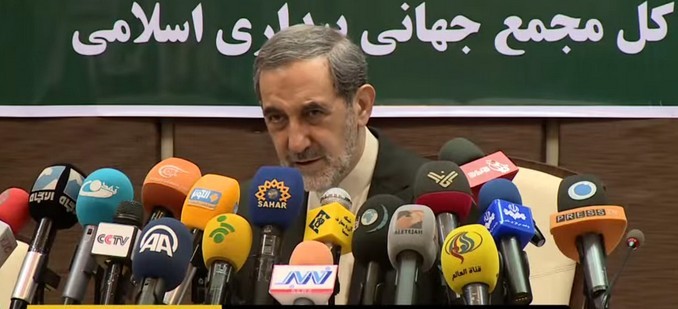A senior advisor to Iran’s Supreme leader Ayatollah Ali Khamenei, doubled down on one of Iran’s demands included in a “fact sheet” published by Iran’s parliament according to a report Wednesday in the semi-official Fars News Agency. Ali Akbar Velayati, Khamenei’s top adviser for international affairs said that the lifting of sanctions imposed on Iran for its illicit nuclear program should occur when an agreement is signed, not when Iran’s compliance with the International Atomic Energy Agency’s (IAEA) demands is certified.
“The simultaneous restriction of Iran’s nuclear capacities and the removal of sanctions is an important demand by Iran which should be respected,” Velayati told reporters and after his meeting with German Deputy Foreign Minister Markus Ederer in Tehran on Wednesday.
He underlined that Iran will never accept to wait for the IAEA’s approval, and said, “If Iran begins restricting nuclear activities, but the other side waits for the IAEA’s confirmation of our measures to remove the sanction, such a move will by no means be acceptable to Iran.”
Velayati’s statement reiterates a demand in listed in the “fact sheet” that was published Wednesday. The fact sheet states:
By terminating all sanctions in a single step right at the start of the implementation of the final comprehensive agreement, the Supreme Leader’s statement that termination of sanctions is part of the agreement and not its result will be materialized.
Based on the Geneva agreement, after the implementation of the JCPOA, all UNSC, US and EU sanctions should be terminated and no new (UNSC) resolution would be needed in this regard; Hence, terminating the UNSC sanctions will close the case and no new resolution which would pave the ground for new plots will be issued.
Iran had already committed to participate in a joint committee to “work with the IAEA to facilitate resolution of past and present issues of concern,” in the Joint Plan of Action (.pdf) signed in November 2013. United Nations Security Council Resolution 1696, the first of six resolutions passed to address Iran’s illicit nuclear program, called on Iran to “without further delay take the steps required by the IAEA Board of Governors …which it said were essential to build confidence in the exclusively peaceful purpose of the nuclear programme and resolve outstanding questions.” Sanctions were not imposed until Iran failed to comply with 1696 later that year.
Ali Akbar Velayati is one of six past and present Iranian officials for whom Interpol has issued a “red notice,” due to their involvement in the 1994 bombing of the AMIA Jewish community center in Argentina.
[Photo: PressTV News Videos / YouTube ]




